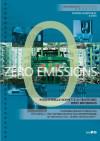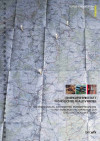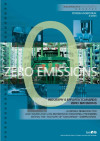Suchergebnisse
Berichte aus Energie- und Umweltforschung 7/1998 Grundlagen für die Ausrichtung eines Technologieschwerpunktes "Nachhaltig Wirtschaften"

Machbarkeitsanalyse
Urban Future - Erhebung von Forschungsfragen zum Thema "Resource Efficient City of Tomorrow"
Herausforderungen für die Städte der Zukunft mit relevanten Forschungsfragen im Hinblick auf Ressourcenmanagement, Ressourceneffizienz und Technologieentwicklungen
INERIWI: Integrierte Nutzungsmodelle zum effizienteren Rohstoffeinsatz im Wirtschaftsbereich
Für wesentliche ressourcenintensive Bedarfsfelder im Wirtschaftsbereich wird die eigentliche Funktion der Produkte analysiert und ausgearbeitet, welche Möglichkeiten bestehen, die eigentliche Dienstleistung bzw. die Funktionen eines Produkts ohne dessen Verkauf bereitzustellen. An Hand der Material- und Energieintensität dieser Bedarfsfelder werden das Potenzial der Umweltentlastung durch integrierte Nutzungsmodelle sowie die ökonomischen und sozialen Implikationen für einzelne Wirtschaftsbereiche abgeschätzt.
Pilotanlage zur Herstellung von extraleichten Sandwichteilen aus Kunststoff im Batchbetrieb
Weiterentwicklung einer Prototypenanlage zur Herstellung von neuartigen Monowerkstoff-Sandwichelementen aus Polypropylen als Karosseriebestandteile für Elektrofahrzeuge und andere Anwendungen im Leichtbau. Aufbauend auf den Ergebnissen eines Bridge-Projektes wurde eine Pilotanlage entwickelt und gebaut, welche einerseits die Herstellung von Nullserien erlaubt und andererseits die notwendigen Erkenntnisse für eine geplante Serienproduktion liefert.
Semi-manual dismantling of small electric and electronic equipment
Improving the tecnology of manual dismantling processes of small electric and electronical appliances, used in social enterprises. Via software modules, developed do analise dismantling processes, from dismantling-factories to dismantling-parks.
Industrielle Schritte In Richtung Zero Emissions

Österreichische Forschung für abfall- und emissionsarme Industrieprozesse im Rahmen von "Fabrik der Zukunft"
Forschungsforum
3/2004
Herausgeber: BMVIT
Deutsch, 6 Seiten
Downloads zur Publikation
Energiewerkstatt Nördliches Waldviertel

Ein kommunales "integriertes" Energieprogramm - durch Forschungskooperation zur erfolgreichen Umsetzung
Forschungsforum
1/1996
Herausgeber: BMVIT
Deutsch, 6 Seiten
Downloads zur Publikation
Sustainable Regional Planning In Austria

The project "Ökofit" - research for integrated technology
Forschungsforum
4/1996
Herausgeber: BMVIT
Englisch, 6 Seiten
Berichte aus Energie- und Umweltforschung 4/2001 PREPARE for the Future - Herausforderung Nachhaltig Wirtschaften

Tagungsband "Österreichischer Cleaner Production Roundtable 2001"
Industry´s Efforts Towards Zero Emissions

Austrian Research for Low-Waste and Low-Emissions in Industrial Processes within the "Factory of Tomorrow" Subprogram
Forschungsforum
3/2004
Herausgeber: BMVIT
Englisch, 6 Seiten
Downloads zur Publikation
Berichte aus Energie- und Umweltforschung 22/2002 Österreichisches Energieforschungs und -technologiekonzept

Ein Orientierungsrahmen für die energiebezogene Forschung und Technologie in Österreich
Neue Nutzungspotentiale von Laubschwachholz in der Forst- und Holzwirtschaft
Anhand der Wertschöpfungsketten vom Waldort bis zum Verarbeiter (Holz verarbeitende Gewerbe bzw. Industrie) wurden die Potenziale von Laubschwachholz (LSH) in Österreich aufgezeigt, die über die Nutzung nur zur Energiegewinnung oder als Industrieholz hinausgehen.
Evaluation of the planning and building processes of multi-storey wooden construction residential and office buildings, and the development of measures to optimise these processes.

An analysis of the building and planning processes of multi-storey wooden construction residential and office buildings, taking into consideration the opinions of the professionals involved (planners, building contractors, building executives), then the development, documentation and distribution of ways to optimise these processes, using "Info-Tool" software.
Chemie, Verfahrenstechnik und Nachhaltige Wirtschaftsentwicklung - CheVeNA: Grundlagen für eine auf eine nachhaltige Wirtschaftsentwicklung ausgerichtete Chemie und Verfahrenstechnik
Die Forschungsarbeiten in diesem Projekt hatten Grundlagen für eine technische Chemie und Verfahrenstechnik zu liefern, die in der Lage sind, den Anforderungen einer nachhaltigen Entwicklung zu entsprechen. Diese Bereiche müssen in ihrer ökologischen, ökonomischen und sozialen Dimension den Anforderungen für Nachhaltigkeit entsprechen. Ein spezielles Augenmerk lag daher auf dem Einsatz nachwachsender Rohstoffe für die Chemische Industrie.
Development of a comprehensive procedure within the design of high-speed-cutting processes in consideration of environmental protection and occupational health aspects
In the metal working industry high-speed-cutting (HSC) in connection with minimal quantity cooling-lubrication promises a high potential for saving process materials. On the one hand costs of purchase and disposal of metal working fluids (MWF) decrease, on the other hand the reduction of dermal diseases and emissions of MWF-dusts are expected.
Intelligent and Green? - Nutzer-zentrierte Szenarien für den Einsatz von I&K-Technologien in Wohngebäuden unter dem Gesichtspunkt ihrer Umwelt- und Sozialverträglichkeit

Nutzerzentrierte Szenarien für den Einsatz von I&K-Technologien in Wohngebäuden unter dem Gesichtspunkt ihrer Umwelt- und Sozialverträglichkeit
Ressourceneffizienzssteigerung durch experimentelle Optimierung der Dampfbereitstellung und durch Reduktion der Produktionsabfälle in einem metallverarbeitenden Betrieb.
Das Projekt baut auf den Ergebnissen des laufenden Projekts "Abwärmenutzung und Einsatz erneuerbarer Energieträger in einem metallverarbeitenden Betrieb" auf. In diesem Projekt wurde bislang unter Anderem festgestellt, dass fast die Hälfte des Erdgaseinsatzes zur Dampferzeugung aufgewendet wird. Auf Basis bereits durchgeführter Berechnungen soll experimentell untersucht werden, inwieweit sich die Energieeffizienz durch Absenken der Dampftemperatur und durch teilweisen Ersatz des Dampfes durch Heißwasser steigern lässt. Eine weitere Steigerung der Energieeffizienz soll dadurch erreicht werden, dass betriebsinternes Abfallmaterial als zusätzlicher Brennstoff in einer Festbrennstofffeuerung verwertet wird.
Establishment of a "Sustainability Label for repair-friendly constructed electr(on)ic household appliances (brown and white goods) as a shopping guideline for consumers"
The scope of the project comprises the development of criteria for a Sustainability Label for repair-friendly constructed appliances, marketing and PR activities with a focus on producers and consumers, training of auditors and labelling of at least one product.
"Etablierung eines Nachhaltigkeitssiegels für reparaturfreundlich konstruierte Elektro(nik)-Geräte (Weiß- und Braunware) zur Orientierung der KonsumentInnen bei Kaufentscheidungen"
Das Projekt umfasst die Ausarbeitung der Kriterien eines Nachhaltigkeitssiegels für reparaturfreundlich konstruierte Geräte, gezielte Marketing- und Öffentlichkeitsarbeit bei HerstellerInnen und KonsumentInnen, Ausbildung von PrüferInnen und Vergabe eines Nachhaltigkeitssiegels.
Erstellung eines Konzeptes zur Entwicklung der "Dienstleistung Schmierung" zur Maximierung der Anlagenlebensdauer auf Basis von Ionischen Flüssigkeiten als Spezialschmiermittel
Entwicklung des Konzeptes der "Dienstleistung Schmierung" mit dem Ziel der wesentlichen Steigerung der Lebensdauer von technischen Anlagen und somit einer Reduzierung deren Ressourcenverbrauches - eine Kombination aus Entwicklungs-Dienstleistung, Produktherstellung und Schmier-Dienstleistung.
